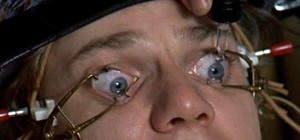When you're trapped at your desk before a jumble of data just waiting to be categorized, or zoning out during an important meeting, your mind wanders and, chances are, you feel a little guilty because of it. Yet you shouldn't try to reign in that distracted thinking. Instead, let your brain get distracted, and you'll unconsciously strengthen your memory.
Get Focused by Getting Distracted
Before you chastise yourself for taking yet another unplanned daydreaming break, you might want to consider thanking your brain for its supposed lack of focus. Daydreaming can both improve our memory and, surprisingly, our ability to focus.

A study conducted by researchers at both the University of Wisconsin and the Max Planck Institute for Human Cognitive and Brain Science recently uncovered the benefits of daydreaming. The researchers found that when our minds wander, we increase our working memory, or ability to "retain and recall information in the face of distractions," as Smithsonian Magazine explains. During daydreams, our brains are actually helping us hone in on tasks and information while blocking out what's unnecessary.
Participants in the research study were given redundant, monotonous tasks designed to encourage daydreaming, followed by a series of math and memory problems. Those who zoned out during the repetitive tasks ended up performing better on the test, indicating that their better working memory was the result of daydreaming. The participants who remained focused both on the first series of boring tasks and the problems afterward were too zoned in to adapt to changes that appeared during the final test.
As F. Diane Barth confers at Psychology Today, "... the more we daydream, the more our brain is able to both hold onto and remember things when we are being bombarded from all sides by all kinds of noise, information input, and conflicting demands." Rather than losing ourselves in mental distractions, daydreaming is an act of concentration. You're not trying to escape the task at hand; rather, you're trying to eliminate all of the information and stimuli that could pose as distractions.
Gain Stronger Skills Each Time You Daydream
The positives that accompany daydreaming aren't limited to a stronger memory, though. As Smithsonian Magazine points out, it's tied to even more skills than we might ever expect.

Those memory-enhancing powers of wandering minds also make daydreamers forward-thinking people. Ever find yourself thinking about the task at hand, then seconds later slipping into thoughts about what you'll be cooking for dinner later that evening? This mental "jumping", or zoning out, is actually a form of planning—and we don't even realize it.
By thinking about what's to come when we daydream, we're making mental notes and plans for those events and situations. And it's much more than list building. Smithsonian Magazine notes that these thoughts are a sign that our brains are trying to tackle problems. If you're not focused at work because you can't stop thinking about your friend's birthday gift, your brain believes that the gift is a more pressing matter.
The more we daydream, the better we become at mastering our everyday lives. So go ahead, think about how tomorrow's rain might affect your commute—you'll end up with a genius plan for the situation should it arise.
Make Time for Mental Unplugging
Of course, you can only reap the positive effects of a wandering mind if you succumb to the "distraction." With the pressure to perform quickly and perfectly at work, and the desire to stay connected through technology at all times, it can be tough to work a little daydreaming into your daily life.

Barth believes that we're actually daydreaming less than ever before due to this ever-connectedness. In theory, it's easy to daydream: just let your mind run free with plans, schedules, ideas, and thoughts. Yet, as Barth explains, zoning out before Netflix on our tablets and mindlessly scrolling through our Facebook news feed tend to take up what was previously designated mind-wandering time. Rather than succumbing to mental distraction, it's easier and more common for us to hop online and kill time that way.
Don't let bright screens take away the great benefits of zoning out. As Barth points out, the mental downtime that daydreaming gives us is more stimulating than most of what we do with technology. Work your brain muscles and take some time to let your mind run wild each day, no matter how tempting your favorite app is.
Feel Free to Take a Brain Vacation
Now that you know just how beneficial your daydreams are, don't be afraid to allow your mind to wander at work. Chances are, your mind is just looking for a new method of focusing—and if your boss wonders why you're staring into space rather than typing away at your desk, remind them that you're actually hard at work, improving your memory and dissecting what's before you.
For more memory-enhancing tips, check out these 7 ways to boost your brain power. Also, try using dirty pictures to remember things quickly, and different fonts to recall more of what you read.
Just updated your iPhone? You'll find new emoji, enhanced security, podcast transcripts, Apple Cash virtual numbers, and other useful features. There are even new additions hidden within Safari. Find out what's new and changed on your iPhone with the iOS 17.4 update.
























Be the First to Comment
Share Your Thoughts